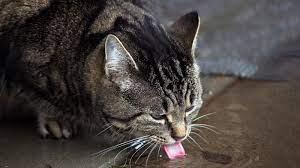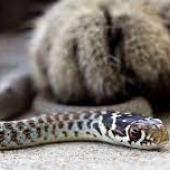Antifreeze (ethylene glycol) poisoning in your cat

Antifreeze, a common household product used to protect car engines, poses a severe threat to cats. Ethylene glycol, the main ingredient in antifreeze, is highly toxic and can lead to fatal poisoning if ingested. This article aims to raise awareness about the dangers of antifreeze poisoning in cats, outline its symptoms, and provide essential information on prevention and immediate action in case of exposure.
Antifreeze (ethylene glycol) poisoning in your cat
Antifreeze is one of a number of products containing ethylene glycol which is very toxic to cats. If you suspect your cat has had access to anything containing ethylene glycol you must seek immediate veterinary attention. Some cats treated within 3 hours of drinking the poison will survive but if treatment is delayed almost all cats will die.

How might my cat access the poison?
Many goods contain ethylene glycol, often called ethanediol, to prevent freezing. It is most frequently utilized in automobiles, particularly in radiators and window washer fluid. The most usual places that cats find antifreeze are when it has spilled into a puddle, drained into a container in a garage, or spilt while topping off fluid levels in a car.
Regretfully, cats find the product highly appetizing and will gladly suck up the liquid. The second method of ethylene glycol exposure for cats results from this palatability and is caused by intentional poisoning. Unfortunately, some people decide to use this approach to get rid of cats that they consider to be a nuisance.
The majority of poisonings happen in the spring when radiators are emptied or in the winter when antifreeze is extensively used. But ethylene glycol-containing antifreeze can be sitting around all year in garages and sheds.
How much antifreeze does it take to make a cat ill?
Because of their heightened sensitivity, cats should never be exposed to even little amounts of ethylene glycol. Even drinking rainwater that gathers in a container that once held antifreeze can harm cats. Therefore, you should take your cat to the clinic right away for treatment if you know they have used any of these products.
Understanding the Dangers
Ethylene glycol poisoning is a medical emergency for cats. Even a small amount ingested can cause irreversible kidney damage and lead to death within hours. Cats are naturally curious creatures, and they may be attracted to the sweet taste of antifreeze, making accidental ingestion a significant concern for pet owners.
How would I know if my cat had been poisoned?
After ingesting the toxin, cats may experience depression and saliva drool within hours.After that, they might seem to get better, but a day later, they might stop eating. Cats that are impacted by ethylene glycol exhibit a wide range of hazy symptoms of sickness, but the kidneys are the primary organ affected. Cats who have been poisoned will become despondent and throw up. Depression and breathing problems may get worse as the illness worsens, leading to seizures and possible coma in the cat.
Symptoms of Antifreeze Poisoning
-
Drunken Behavior: Cats may appear disoriented, uncoordinated, and exhibit a lack of balance, resembling drunkenness.
-
Excessive Thirst and Urination: Increased thirst and frequent urination are common early signs of poisoning.
-
Vomiting: Cats may vomit shortly after ingesting antifreeze.
-
Depression and Lethargy: Affected cats often become lethargic and unresponsive.
-
Seizures: Seizures can occur as the poisoning progresses, indicating severe neurological damage.
-
Rapid Breathing: Cats may exhibit rapid, shallow breathing as a result of respiratory distress.
-
Kidney Failure: Within 12-24 hours, severe kidney failure sets in, leading to dehydration, loss of appetite, and a marked decrease in urine production.
How would my vet know if my cat has been poisoned?
A marker dye used in certain antifreeze formulations is eliminated through urine excretion. To verify that your cat was exposed to the poison, your veterinarian might be able to analyze its pee immediately after it has consumed it.Take your cat to the veterinarian right away if you think they may have gotten into antifreeze and ask for more guidance.
When a cat is poisoned, testing on their blood and urine will soon begin to reveal evidence of kidney damage, necessitating immediate medical attention. In advanced stages of the illness, an ultrasound may reveal renal damage.
Immediate Action and Veterinary Care
If you suspect your cat has ingested antifreeze, every second counts. Immediate action is crucial:
- Contact Your Veterinarian: Inform your veterinarian about the situation and head to the clinic immediately.
-
Do NOT Induce Vomiting: Unlike some toxins, inducing vomiting is not recommended for antifreeze ingestion due to its corrosive nature, which can cause further damage to the esophagus.
-
Hydration: If it's safe and immediate veterinary care is not available, try to encourage your cat to drink water to dilute the toxin. Do not force water into the cat's mouth.
-
Activated Charcoal: If advised by your veterinarian, administer activated charcoal to help absorb the toxin in the stomach.
-
Veterinary Treatment: Upon reaching the veterinary clinic, your cat may require intravenous fluids, ethanol therapy, or other treatments to counteract the effects of ethylene glycol poisoning.
Will my cat get better?
There's a good chance your cat will survive if your veterinarian treats them very early. Cats who receive treatment after being poisoned and wait longer than a few hours are not likely to make it. Unfortunately, medication may not be able to help after the usual symptoms of poisoning appear.
For the cats who do make it through, recovery takes three to five days.
Prevention is Key
Preventing antifreeze poisoning is the best approach:
-
Secure Storage: Store antifreeze and other chemicals in sealed containers, out of reach of pets.
-
Clean Spills Immediately: If you spill antifreeze, clean it up immediately and thoroughly. Consider using pet-friendly antifreeze alternatives made with propylene glycol.
-
Educate Others: Inform family, friends, and neighbors about the dangers of antifreeze poisoning in pets to raise awareness in your community.
-
Regular Check-ups: Schedule regular veterinary check-ups to monitor your cat's health and catch any potential issues early.
In summary, antifreeze poisoning is a life-threatening emergency for cats. Quick action and preventive measures are essential to safeguard your feline companion from this deadly toxin. Awareness, responsible storage, and immediate veterinary care can make a significant difference in saving a cat's life in the event of antifreeze exposure.



